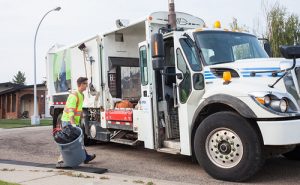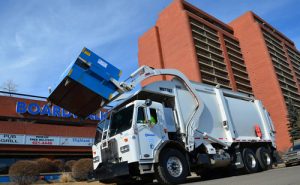City Budget Bulletin #2: Waste Management
In January 2018, a Waste Services Audit found that while costs have risen, the City’s waste management program has fallen far behind its targets. In 2007, the City set a 90% diversion rate target by 2012, meaning only 10% of waste is sent to landfills with the other 90% diverted from landfills (i.e. recycled, composted, or put to some other use). The City has fallen short of this target – diversion rates hit a peak of 49.5% in 2013, yet fell to 35.7% in 2016. The City Auditor also found that the cost of processing waste increased from $130 per tonne in 2012 to $152 per tonne in 2016.

Plainly put, the City is paying more to divert less waste.
The City has acknowledged this problem and is working to reduce costs and increase diversion within the system. A green bin pilot program is slated to start in 2019, which would see residents sort their organic waste into a separate bin. The City is also considering a limit on how many bags of trash can be put on the curb.

Residential pick-up is not the City’s only line of business, however. The City also began collecting commercial waste back in 2008. The goal of this program was to divert more waste from landfill, as commercial waste accounts for 60% of Edmonton’s trash. The City’s operations in this sector are not achieving their goals. In August 2018, City Administration reported that “the impact is low and achieving diversion comes at a high financial cost.” Only 4.3% of Edmonton’s commercial waste is recycled through the City’s operations, and the City has lost $6.2 million since 2012.
Throughout the summer, as we’ve dug deeper into the City’s spending and operations, one question arises repeatedly. Are there City programs or services that are better delivered by other orders of government, non-profit organizations or the private sector?
Edmonton has a strong private waste management industry, which already collects the vast majority of commercial trash in the City. However, these private haulers are not able to access the Edmonton Waste Management Centres processing facilities, which include composting, gas recovery, biofuels production, and others.
Given that the City competes with private industry, loses roughly $1 million each year, and diverts only 4.3% of commercial waste in the process, it’s time to change course. The Edmonton Chamber of Commerce believes that the City should work with private industry to find more cost-effective methods of diverting waste from landfills.
It’s important to note that these changes would not directly impact taxes, as waste management is funded through utility rates and user fees. Eliminating a money-losing program, however, could free up City funding for more effective waste-related initiatives. Keeping our waste out of landfills is the right thing to do, and we need to help the City find cost-effective ways to increase their diversion rates.Questions for the City: 1. What are the most cost-effective options for increasing Edmonton’s diversion rates? 2. Can the City keep more waste out of landfills by engaging private industry in a larger role? 3. What is the City’s rationale for competing with private industry on commercial waste collection?
Let us know what you think of this Bulletin and, if you agree, contact the Mayor and Council.Tell us how property taxes have affected you and any savings or other ideas you have for making Edmonton more competitive for business.
Contact us at policy@edmontonchamber.com
